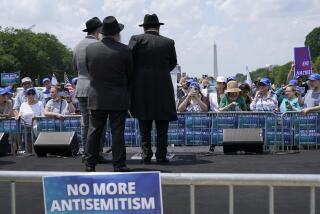Arab Americans Fear Rise of Bigotry if U.S. Bombs Iraq
- Share via
As President Clinton weighs a military strike against Iraq, Arab and Muslim Americans in Southern California fear that hatred of Iraqi President Saddam Hussein could turn into bigotry against local residents.
While representatives of Muslim and Arab American groups warn that a U.S. military attack would harm Iraqi civilians more than Hussein, they also fear that a war in Iraq could breed racism against Muslim and Arab Americans.
“We’re concerned first that the people of Iraq have suffered tremendously, and secondly that there will be a local [anti-Arab] backlash from the public at large,” said Michel Shehadeh, West Coast director of the American-Arab Anti-Discrimination Committee.
The fear of bigotry stems from the anti-Arab and Muslim hostility that erupted in the United States during the Persian Gulf War, and after bombings at the World Trade Center in New York and the Oklahoma City federal building.
The anti-discrimination committee recorded 119 hate crimes nationwide against Arab Americans in 1991, the year of the Gulf War. Most involved threats and intimidation, but some were assaults, vandalism of homes and businesses, bombings and arson.
In the three days after the 1995 Oklahoma City federal building bombing, an anti-defamation group counted 222 attacks against American Muslims, ranging from shots fired at mosques to spitting on women wearing shawls.
Several American Muslim and Arab groups have opposed the use of economic sanctions and military force against Iraq. Along with the committee, the National Assn. of Arab Americans and the Muslim Public Affairs Council have said that sanctions have hurt innocent Iraqis and that military attacks would kill civilians without removing Hussein.
Salam Al-Marayati, director of the Muslim Public Affairs Council in Los Angeles, emphasized that his group’s stance is that of an American advocacy group. “We take no money from foreign governments, and we don’t take sides in squabbles in the Middle East,” he said.
What the council opposes, Al-Marayati said, is “our tax dollars being used for something that would result in the killing of innocent people.”
But Americans of Muslim and Arab heritage are often attacked whenever the United States is caught in a Middle Eastern crisis, much as German Americans were victimized during World War I and Japanese Americans were persecuted in World War II. “We still haven’t learned to blame the individuals who commit a crime,” said Don Bustany, a past president of the Los Angeles chapter of the anti-discrimination committee.
Shehadeh said that members of his group had their cars scratched and tires slashed during the Gulf War, and Arab American store owners were told by customers to “go back where you came from.”
He remembers his son Abraham, then in elementary school, coming home in tears. “Somebody called him Abraham Saddam, and the kids said they were going to kick Saddam’s butt. He didn’t understand why they were doing this to him,” he said.
Al-Marayati said he heard reports during the Gulf War of people attacking Latinos they mistook for Muslims or Arabs.
Some are hopeful that in the seven years since the Gulf War and the two years since the Oklahoma City bombing, Americans may have learned not to stigmatize their neighbors.
Bustany said that after the Oklahoma City bombing, many television stations at first reported that Islamic fundamentalists were the prime suspects. Those mistakes may have “taught the press a lesson” and shown the public the importance of caution, he said.
At the New Horizon School in Pasadena, a private Muslim school, middle school Vice Principal Amira El-Farra said children were not worried about a potential increase in discrimination.
A student discussion of the Iraq situation Friday, she said, focused on the possible harm to Iraqi children and the conflict between Saddam Hussein’s position as a dictator with Muslim values.
“This is a cosmopolitan area, I think there’s more awareness,” El-Farra said.
Shehadeh said that although he thinks Americans are now more tolerant than a few years ago, he has encountered some recent hostility.
During a trip to Phoenix two months ago, Shehadeh said a man in a hotel lobby told him to pass a few threatening words to Saddam Hussein. When Shehadeh asked the stranger to explain his comment, the man replied “You know what I mean.”
“I didn’t know what he meant,” Shehadeh said.
More to Read
Sign up for Essential California
The most important California stories and recommendations in your inbox every morning.
You may occasionally receive promotional content from the Los Angeles Times.













